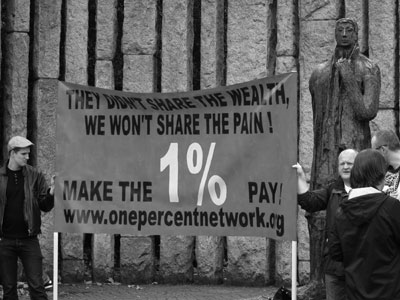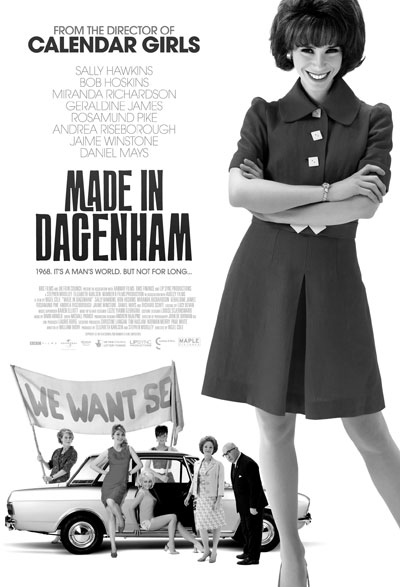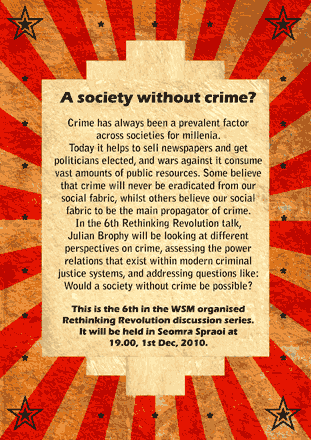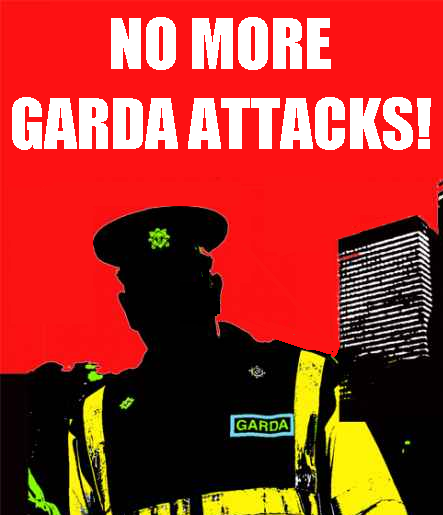Over 30 years of anarchist writing from Ireland listed under hundreds of topics
Democracy in Brazil - Workers Party suppresses anarchists
 As this issue of Workers Solidarity goes to print, Brazil is about to elect a new president. After eight years, the Workers’ Party (PT) incumbent, Lula, must step down. His chosen successor, Dilma Roussef, is poised to become Brazil’s first female president, as she holds a 46.9% to 32.6% lead over her closest rival after the first round of voting. Roussef is a former urban guerrilla who was tortured by the western-backed military dictatorship (1964-1985) before throwing her lot in with electoral politics, joining the PT in 2000.
As this issue of Workers Solidarity goes to print, Brazil is about to elect a new president. After eight years, the Workers’ Party (PT) incumbent, Lula, must step down. His chosen successor, Dilma Roussef, is poised to become Brazil’s first female president, as she holds a 46.9% to 32.6% lead over her closest rival after the first round of voting. Roussef is a former urban guerrilla who was tortured by the western-backed military dictatorship (1964-1985) before throwing her lot in with electoral politics, joining the PT in 2000.
Report on the 1st 1% tour - 1% of the Population, 34% of the Wealth
 Countless walking tours make their way around Dublin daily; generally educating the masses of tourists on the lives lived on these streets before us. It was a different kind of walking tour, comprising around 200 people, that hit the streets around Stephen’s Green on October 9th last.
Countless walking tours make their way around Dublin daily; generally educating the masses of tourists on the lives lived on these streets before us. It was a different kind of walking tour, comprising around 200 people, that hit the streets around Stephen’s Green on October 9th last.
Film Review: Made in Dagenham
 If you like ‘feel good’ films this is for you. Leaving a cinema feeling both entertained and optimistic is rare enough, and this film scores highly on both points.
If you like ‘feel good’ films this is for you. Leaving a cinema feeling both entertained and optimistic is rare enough, and this film scores highly on both points.
In 1968 there were 55,000 working at Ford’s massive plant in east London. One of them is machinist Rita O’Grady, who makes seat covers with 156 other women at the Dagenham factory. Thinking that women won’t cause trouble, management regrades them as ‘unskilled’.
That's Capitalism! Tax dodging with pensions and other stories
 Last year the Exchequer lost €7.4bn as a result of the tax break regime, over three times the EU average. According to the government’s own Economic and Social Research Institute, 80% of the tax relief available on pension contributions goes to the wealthiest 20% of earners.
Last year the Exchequer lost €7.4bn as a result of the tax break regime, over three times the EU average. According to the government’s own Economic and Social Research Institute, 80% of the tax relief available on pension contributions goes to the wealthiest 20% of earners.
Dub: Crime: modern conceptions and possible alternatives - Rethinking Revoluton 6

Crime has always been a prevalent factor across societies for millenia; today it helps to sell newspapers and get politicians elected, and wars against it consume vast amounts of public resources. Some believe that crime will never be eradicated from our social fabric, whilst others believe our social fabric to be the main propagator of crime. In the 6th Rethinking Revolution talk, Julian Brophy will be looking at different perspectives on crime, assessing the power relations that exist within modern criminal justice systems, and addressing questions like: Would a society without crime be possible?
The 10/10 Event: Origins of an Economic Meltdown

The purpose of this text is to try and tell the story of our current economic situation, how we got here, and what we can expect from the near future, so as to better understand the tasks facing us.
This is neither an academic text on history, nor yet, god forbid, a treatise on macroeconomics. So in the interests of telling a listenable story we will use the old storytelling technique of jumping directly into the middle and exploring outwards in flashback and flash-forward vignettes to build the big picture. But where is the middle?
"IRA Undefeated Army" a dangerous myth
 James McBarron was a long time activist in Sinn Fein before becoming an anarchist in the aftermath of the Good Friday agreement. In this opinion piece he wrote for publication on republican discussion forums he argues that although it is "completely understandable that most thinking republican activists are angry and enraged at how they were duped and used by the former IRA and current Sinn Fein leadership … this does not excuse people from properly examining their own roles and politics and the politics and conditions that have lead to the current situation." He then points to four areas which he thinks represent fatal weaknesses of 'dissident' Irish republicanism in general.
James McBarron was a long time activist in Sinn Fein before becoming an anarchist in the aftermath of the Good Friday agreement. In this opinion piece he wrote for publication on republican discussion forums he argues that although it is "completely understandable that most thinking republican activists are angry and enraged at how they were duped and used by the former IRA and current Sinn Fein leadership … this does not excuse people from properly examining their own roles and politics and the politics and conditions that have lead to the current situation." He then points to four areas which he thinks represent fatal weaknesses of 'dissident' Irish republicanism in general.
Dublin: March In Opposition To Garda Brutality Against Protestors

Students call on other students, workers and all opposed to Garda violence and intimidation of protestors to join us next Wednesday in marching to Pearse Street Garda Station.
Meet up point: Wolfe Tone statue, Stephens Green. (6p.m.)
Why bond price matters - Apocalyptic cuts package fails to get State borrowing off life support
The markets have spoken and the verdict is that Brian Lenihan's 6 billion euro package of public sector cuts and extra taxation on ordinary workers is not going to work. The confidence in Ireland's future in the international money markets is reflected in the yields in Irish sovereign bonds. These bonds are the IOUs the government issues to borrow the money to plug the shortfall from income to spending. They vary from 2 to 14 years in duration before the money borrowed has to be repaid, the 10 year being the one most closely followed by market watchers. The yield on a bond is the interest rate the state has to pay the lenders. In these last few days increasingly urgent stories in the business pages of the papers have been warning about the dangers of increasing bond yield spreads.
The Belfast police mutiny of 1907
 During the 1907 Dock strike in Belfast there was a police mutiny involving 70% of the Belfast police. In this article John Gray argues that "When we look at the 1907 Dock Strike in Belfast and the police mutiny of the same year simple myths begin to evaporate. We find unskilled workers, mainly Protestant, fighting the employers, many their future leaders in the UVF, we find policemen, many Protestant, mutinying, we find the Independent Orangemen mustering hundreds of Protestant workers under a platform asking Protestants as Irishmen to play their part in the development of Ireland as a nation." The article is from Anarchy No 6, published in London in 1970
During the 1907 Dock strike in Belfast there was a police mutiny involving 70% of the Belfast police. In this article John Gray argues that "When we look at the 1907 Dock Strike in Belfast and the police mutiny of the same year simple myths begin to evaporate. We find unskilled workers, mainly Protestant, fighting the employers, many their future leaders in the UVF, we find policemen, many Protestant, mutinying, we find the Independent Orangemen mustering hundreds of Protestant workers under a platform asking Protestants as Irishmen to play their part in the development of Ireland as a nation." The article is from Anarchy No 6, published in London in 1970

